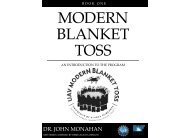Modern Blanket Toss: Findings and Observations
This book is the last in a series of three covering the National Science Foundation awarded Modern Blanket Toss project. In this book are the evaluation findings for each of the three years as well as observations from Modern Blanket Toss staff.
This book is the last in a series of three covering the National Science Foundation awarded Modern Blanket Toss project. In this book are the evaluation findings for each of the three years as well as observations from Modern Blanket Toss staff.
Create successful ePaper yourself
Turn your PDF publications into a flip-book with our unique Google optimized e-Paper software.
CHALLENGES AND LESSONS LEARNED<br />
Community Projects<br />
The MBT project revealed many challenges in the way that we help<br />
students utilize technology to address issues within their<br />
communities. <br />
The coordinators who work with the students need training in the<br />
areas of the growth mindset, project management, <strong>and</strong> how to be<br />
part of a support network. <br />
Most communities in MBT were not successful in achieving their<br />
project goals in part due to an absence of an engaged community<br />
member. <br />
During the 2016 summer session, we worked with stakeholders in<br />
the Fairbanks community to find issues <strong>and</strong> or projects that are<br />
achievable by the students using their UAV <strong>and</strong> GIS skills. We<br />
found positive results working with Bernie Karl, owner of the Chena<br />
Hot Springs Resort. Once the project was first vetted by MBT staff<br />
to assure that the task was reasonable, Mr. Karl had the opportunity<br />
to meet with the students. He expressed that he was in need of<br />
data to support a significant business decision. From that first<br />
opening conversation, the students connected with Mr. Karl <strong>and</strong><br />
were excited to make something happen. <br />
With this motivation, it was like dealing with an entirely different<br />
group of learners. It was easy to guide them into asking the<br />
questions <strong>and</strong> setting up the resources. At that point, it was easy<br />
for us to ensure their success.<br />
We noticed this in the communities as well. Those students that had<br />
a person from their community who revealed a need for the data<br />
were able to move much further on their projects than those that<br />
were internally managing themselves.<br />
65




